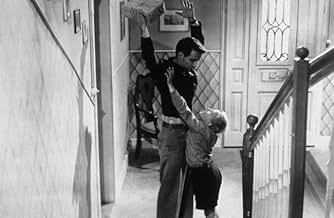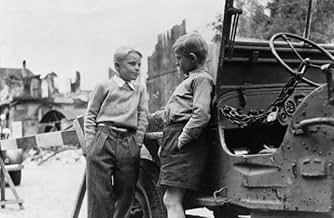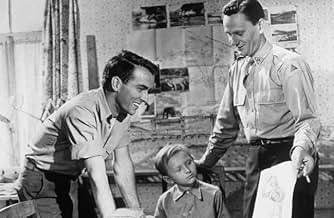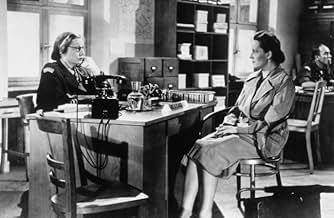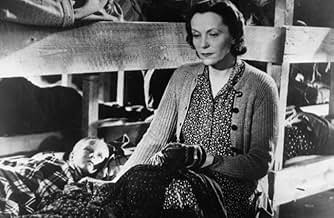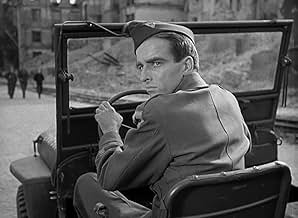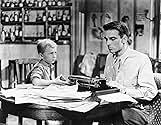IMDb RATING
7.8/10
5.2K
YOUR RATING
In post-war Berlin, an American private helps a lost Czech boy find his mother.In post-war Berlin, an American private helps a lost Czech boy find his mother.In post-war Berlin, an American private helps a lost Czech boy find his mother.
- Won 1 Oscar
- 7 wins & 7 nominations total
Featured reviews
The Search (1948)
This is a critical film in director Fred Zinnemann's career. After years of doing shorts and B features, and after WWII had ravaged the world, he turned to a subject that must have ripped him up every day he was shooting. The story of orphaned kids, most of the Jewish, in the rubble of post-War Germany.
You see, both his parents were killed by the Nazis in the war. And here he was, a man with roots in documentary film in the 1930s, making real one of the remaining problems recovering from Nazi mess, these displaced children. The black and white filming is gritty and polished at the same time, and much of it is shot on location in the real ruins of Germany in the American sector (in Nuremberg). For that alone it's worth seeing.
By the way, the interior work was done in a Swiss garage—the crew for the whole film consisted of a total of ten Swiss technicians and a truck. Though the movie was an American release, the main producer was Swiss, too. All of these are reasons why it feels different than what Hollywood might have attempted on studios lots, and probably failed at least in authenticity.
Throw in that Montgomery Clift is starring in the lead role and you have another reason to watch. He's really wonderful, already feeling like the mature, charming, disarming young man he is famous for on screen. Be warned however—he doesn't show up until nearly halfway through. The first half of the movie is touching but makes for disappointing drama, forming a quasi-documentary overview of the horrid situation but with a voice-over that means well but makes it almost sentimental instead of tragic. Be sure to stick it out until the real plot kicks in with Clift sitting in a Jeep.
There are other actors here—the mother looking for her child is an opera singer in real life and is more pathetic than persuasive, and the chief nurse, played by Aline MacMahon, is terrific. Still, the movie, and the screen time in the second half, is Clift's, thankfully, and the boy's. This child was discovered while scouting for the movie, apparently, and is a Czech kid names Ivan Jandl. Amazingly, he knew no English when the movie started, and was coached by Clift as they went, very much like happens in the movie. This obviously makes it more convincing top to bottom.
And makes you love Clift even more. He took the role quite seriously, studying (according to a TCM article worth googling) American soldier engineers by living with them, especially trying to get the way they walked. Fascinating details for a movie that depends on its verisimilitude above all.
If there is an inevitable arc to the events, you'll have to live with it. And if some of the acting is average, and some of the plot requiring patience, you'll have to live with that, too. It's not a gem taken whole. But the best of it is remarkable. An absolute must-watch if you like this period, the director, or even this kind of shooting, which has an echo of "Rome Open City" and other European productions shot in the actual remains of Old Europe.
This is a critical film in director Fred Zinnemann's career. After years of doing shorts and B features, and after WWII had ravaged the world, he turned to a subject that must have ripped him up every day he was shooting. The story of orphaned kids, most of the Jewish, in the rubble of post-War Germany.
You see, both his parents were killed by the Nazis in the war. And here he was, a man with roots in documentary film in the 1930s, making real one of the remaining problems recovering from Nazi mess, these displaced children. The black and white filming is gritty and polished at the same time, and much of it is shot on location in the real ruins of Germany in the American sector (in Nuremberg). For that alone it's worth seeing.
By the way, the interior work was done in a Swiss garage—the crew for the whole film consisted of a total of ten Swiss technicians and a truck. Though the movie was an American release, the main producer was Swiss, too. All of these are reasons why it feels different than what Hollywood might have attempted on studios lots, and probably failed at least in authenticity.
Throw in that Montgomery Clift is starring in the lead role and you have another reason to watch. He's really wonderful, already feeling like the mature, charming, disarming young man he is famous for on screen. Be warned however—he doesn't show up until nearly halfway through. The first half of the movie is touching but makes for disappointing drama, forming a quasi-documentary overview of the horrid situation but with a voice-over that means well but makes it almost sentimental instead of tragic. Be sure to stick it out until the real plot kicks in with Clift sitting in a Jeep.
There are other actors here—the mother looking for her child is an opera singer in real life and is more pathetic than persuasive, and the chief nurse, played by Aline MacMahon, is terrific. Still, the movie, and the screen time in the second half, is Clift's, thankfully, and the boy's. This child was discovered while scouting for the movie, apparently, and is a Czech kid names Ivan Jandl. Amazingly, he knew no English when the movie started, and was coached by Clift as they went, very much like happens in the movie. This obviously makes it more convincing top to bottom.
And makes you love Clift even more. He took the role quite seriously, studying (according to a TCM article worth googling) American soldier engineers by living with them, especially trying to get the way they walked. Fascinating details for a movie that depends on its verisimilitude above all.
If there is an inevitable arc to the events, you'll have to live with it. And if some of the acting is average, and some of the plot requiring patience, you'll have to live with that, too. It's not a gem taken whole. But the best of it is remarkable. An absolute must-watch if you like this period, the director, or even this kind of shooting, which has an echo of "Rome Open City" and other European productions shot in the actual remains of Old Europe.
Enjoyed this film from beginning to the very end because of a great story about children who were separated from their parents by Nazi Germany and they were also placed in concentration camps and marked with a number like cattle. Montgomery Clift, (Steve Stevenson) plays the role as an Army personnel who finds a very young boy who is starving and gives him some of his lunch. This young boy is named Karel Malik, (Ivan Jandl) who learns to speak English from Steve and starts to forget some of his horrible experiences. However, Karel begins to want to find his mother who is Mrs. Hannah Malik and Hannah is searching all through the ruins of bombed out towns trying to find her son. There is great acting by Montgomery Clift and Wendell Corey and this is a horrible story about the effects Hitler had on young children, men and women who were treated like animals. Great Gem of a Film !.
7sol-
Having fled a refugee centre in post-World War II Germany, a traumatised boy with selective mutism is taken in by a kindly soldier while his mother desperately searches for him in this war drama starring Montgomery Clift as the soldier. 'The Search' was Clift's first big screen performance and he is great every step of the way, radiating genuine excitement when teaching the boy how to speak and the bond that develops between them is undeniable. Jarmila Novotna is also fine as the boy's mother, never once lapsing into melodrama in a nicely down-to-earth turn, and Ivan Jandl as the boy in question won a special Oscar for his performance. The film takes quite a while to warm up with Clift not making an appearance until over 30 minutes in. The beginning portion of the film also features a lot of sentimental voice-over narration that spells out the obvious (the kids are described as "children who had a right to better things"). There are, however, also several fantastic moments early on. The bumpy, silent ambulance ride in which tension and anxiety within the kids gradually swells up rates as one of the finest sequences that director Fred Zinnemann ever filmed - and the subsequent near-silent chase scene is equally as intense. Whatever the case, the final hour or so of the film (in which the narration practically disappears) is excellent stuff. Clift's altruism is especially resonating as the film looks at the ability of humanity to triumph in the face of the inhumanities of war, and the use of actual desolate postwar German locations injects a chilling sense of authenticity into the air.
I got to this movie randomly in the night program and found it was rather undeservedly relegated to past 11pm duties on TV. For Germans, it may be hard to chew the past concentration camp experiences of Children survivors in English and American orphanages and the highlighted search of a mother for her young boy, from whom she has been separated during the war. Sentimental : Yes Heart Gripping : Yes Wonderful to watch to the (happy ???) ending ? Yes all over. Great performances by the young boy, Ivan Jandl, the mother and the orphanage manager and very convincing performances of Montgomery Clift and Wendell Corey as teachers and father stand ins. I do know the ending, but it grips me nevertheless, even on replay. And if you're not icy to the heart, it will do the same for you.
Aside from some dated music and ponderous narration, this is a nearly perfect film. It's surprising, then, that people rarely talk about this being among Montgoery Clift's best work. I, for one, prefer this over From Here to Eternity, Raintree County or even The Heiress. This is because I rarely have encountered a movie that has so pulled me in emotionally to the story. I'm a guy and I don't just start bawling at everything, but I defy ANY person to watch this film with a dry eye! It just doesn't seem possible.
The story is less about G.I. Clift than about a sad but adorable little boy he encounters wandering around in post-war Germany. At first, the boy is wild and doesn't trust anyone, as he and his family had been through the holocaust. Somehow in the concentration camp, he and his mother had become separated and at the end of the war, he had run away from the allied resettlement program because he had a natural fear of ALL soldiers. Despite these tragedies, the boy did not give up hope of one day finding his mother, though Clift plans on taking him back to the States because he knows it is hopeless to go on searching.
You've GOT to see this film! You've GOT to show it to your kids! Although the Diary of Ann Frank and Shindler's List have received a lot of attention, this little film is every bit as poignant and important for understanding the real impact of World War II.
The story is less about G.I. Clift than about a sad but adorable little boy he encounters wandering around in post-war Germany. At first, the boy is wild and doesn't trust anyone, as he and his family had been through the holocaust. Somehow in the concentration camp, he and his mother had become separated and at the end of the war, he had run away from the allied resettlement program because he had a natural fear of ALL soldiers. Despite these tragedies, the boy did not give up hope of one day finding his mother, though Clift plans on taking him back to the States because he knows it is hopeless to go on searching.
You've GOT to see this film! You've GOT to show it to your kids! Although the Diary of Ann Frank and Shindler's List have received a lot of attention, this little film is every bit as poignant and important for understanding the real impact of World War II.
Did you know
- TriviaBen Mankiewicz on TCM indicated that Ivan Jandl spoke no English at the time this film was made, and that his English dialogue was phonetically memorized.
- GoofsOn Montgomery Clift's right shoulder, he wears the patch of the 102nd infantry division, but it is sewed on incorrectly; it is turned 90 degrees to the right.
- Quotes
[Steve is teaching a young boy, whose name he does not know but has coined Jim, to speak English]
Ralph 'Steve' Stevenson: [to Jim] You have no idea how useful it's going to be for you to know English. You can go where ever you like. Everybody knows what 'OK' means. You can use English all over the world. Not, not just America: Canada, Africa, Australia, India. Even in England, they understand English... well, sort of.
- Alternate versionsThere is an Italian edition of this film on DVD, distributed by DNA srl, "LA SETTIMA CROCE (1944) + THE SEARCH (Odissea tragica, 1948)" (2 Films on a single DVD), re-edited with the contribution of film historian Riccardo Cusin. This version is also available for streaming on some platforms.
- ConnectionsFeatured in Hollywood et la Shoah (2004)
- How long is The Search?Powered by Alexa
Details
Box office
- Budget
- $250,000 (estimated)
- Runtime
- 1h 44m(104 min)
- Color
- Sound mix
- Aspect ratio
- 1.37 : 1
Contribute to this page
Suggest an edit or add missing content


